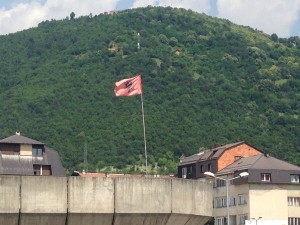By JOSH FRIEDMAN
SKOPJE, Macedonia – Following a turbulent two-year political crisis, Macedonia has a new government and is seeking to expedite its bids to join NATO and the European Union. While tensions have cooled in Macedonia and Skopje has raised its standing in Brussels, the country’s internal ethnic conflict remains very much unresolved and, at the moment, overlooked.
During the political crisis, both major parties in Macedonia orchestrated major protests and sporadic violence occurred. Less than two months ago, a mob stormed the Macedonian parliament and bloodied politicians, including the man who is now prime minister.
RELATED: NO GOVERNMENT, HIGH TENSION IN MACEDONIA
Zoran Zaev, Macedonia’s new western-backed prime minister, says he plans to lead the country into NATO and the EU. The first order of business for Zaev appears to be resolving Skopje’s multi-decade name dispute with Athens. Greece objects to the name of its northern neighbor, arguing that the name of the country is a territorial claim on the northern Greek region of Macedonia. Under Zaev, Macedonia is reportedly considering entering NATO under the provisional name of Former Yugoslav Republic of Macedonia (FYROM).

If Macedonia joins NATO, that will be a political victory for Zaev and the West. Zaev is replacing Macedonia’s former nationalist prime minister Nikola Gruevski, who despite being under criminal investigation, received more votes than Zaev in last December’s parliamentary elections. Gruevski ran afoul of the West and forged some political ties with Russia, despite pursuing integration into NATO and the EU. In recent years, Moscow has been jockeying for influence in the Western Balkans, and NATO in a sense is rushing to secure control of the region.

While the current international news cycle is focused on the name dispute, Macedonia’s internal ethnic conflict may very well be the bigger and longer-lasting problem. Macedonia’s ethnic Albanian minority is demanding that Albanian be made an official language nationwide. Macedonian nationalists see the issue as a stepping stone to federalization of the country and possibly secession. As with other ethnic disputes in the Balkans, there is no clear path to resolution and the problem could linger for many years.
